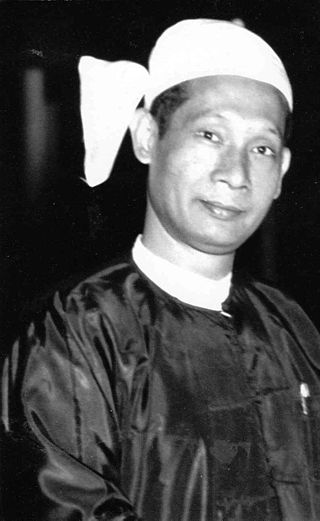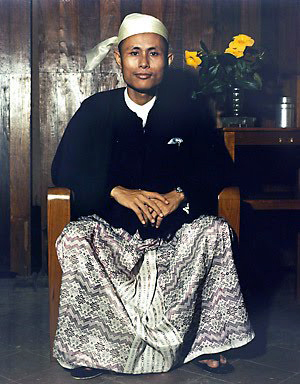Political alliance in Burma
 |
|---|
Government
|
Judiciary
|
Exiled government
|
Related topics |
The People's Democratic Front (PDF) was a political alliance in Burma.
 |
|---|
The People's Democratic Front (PDF) was a political alliance in Burma.
The People's Democratic Front was formed by left-wing politicians in 1951 in order to oppose the ruling Anti-Fascist People's Freedom League (AFPFL). [1] Its members included the Burma Workers and Peasants Party, the Patriotic Alliance, the Burma Democratic Party and the Burma Trades Union Congress. [1] [2]
The PDF won 19 of the 250 seats in the Chamber of Deputies in the 1951–52 general elections, emerging as the main opposition to the AFPFL, which had won 199 seats. In 1955 it was succeeded by the National United Front alliance. [1]

The Anti-Fascist People's Freedom League (AFPFL) was the dominant political alliance in Burma from 1945 to 1958. It consisted of political parties and mass and class organizations.

Ba Swe was the second Prime Minister of Burma. He was a leading Burmese politician during the decade after the country gained its independence from Britain in 1948. He held the position of prime minister from 12 June 1956 to 28 February 1957. When Ba Swe became prime minister, Time magazine reported the news in an article titled: 'The Day of the Tiger' based on his nickname 'Big Tiger' since his university days in the 1930s as a student leader.

The Burma Workers Party, until 1958 the Burma Workers and Peasants Party, was a communist party in Burma, formed on 8 December 1950 by leftist elements of the Socialist Party. In December 1962 it merged with the People's Comrade Party to form the United Workers Party. In March 1964, it was among the many parties banned by decree of the Revolutionary Council.

The National United Front was a political alliance in Burma.

General elections were held in Burma on 6 February 1960 to install a government to take over from General Ne Win's interim administration, established in October 1958. The military-led administration was credited for bringing stability and improving infrastructure in the country, though it suppressed some civil liberties.

General elections were held in Burma to vote for 202 out of 250 seats to the Burmese Chamber of Deputies; the remaining 48 members were elected unopposed as no opposition candidates stood against them.

General elections were held in Burma over several months between June 1951 and April 1952 due to internal conflict within the country.

The Communist Party of Burma (CPB), also known as the Burma Communist Party (BCP), is a clandestine communist party in Myanmar (Burma). It is the oldest existing political party in the country.

General elections were held in Burma on 9 April 1947 to form the basis of a constituent assembly that would design a constitution once independence from the United Kingdom had been achieved. They were the first elections in Burma since its separation from India under the British Raj. Voter turnout was 49.8%. However, Aung San was assassinated three months later, resulting in U Nu becoming the first Prime Minister of Burma.

Kyaw Nyein, called honorifically U Kyaw Nyein, was a Burmese lawyer and anti-colonial revolutionary, a leader in Burma’s struggle for independence and prominent politician in the first decade after the country gained sovereignty from Britain. He held multiple minister portfolios in the government of Prime Minister U Nu, served as General Secretary of the ruling political alliance, Anti-Fascist People's Freedom League (AFPFL), and was joint General Secretary of the Burma Socialist Party (BSP).

The Kachin National Congress was a political party in Burma.

The Arakanese National Unity Organisation (ANUO) was a political party in Burma.

The Burma Democratic Party was a political party in Burma.

The communist insurgency in Burma was waged primarily by the Communist Party of Burma and the Communist Party (Burma) from 1948 to 1989. The conflict ended when the CPB, severely weakened by an internal mutiny, disbanded its armed wing.

The Patriotic Alliance was a political alliance in Burma.

The People's Educational and Cultural Development Organisation was a political party in Burma.

The People's Peace Front was a political party in Burma.

The United Hill People's Congress was a political party in Burma.

The Union Party was the ruling political party in Burma in the late 1950s and early 1960s. Formed by a split in the Anti-Fascist People's Freedom League, it was initially known as the Clean Anti-Fascist People's Freedom League or Nu-Tin faction.

The Stable Anti-Fascist People's Freedom League was a political party in Burma.